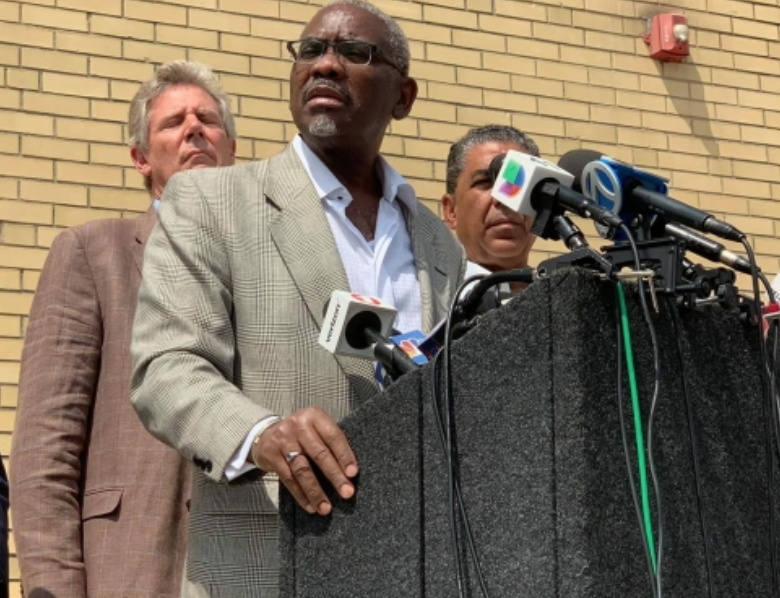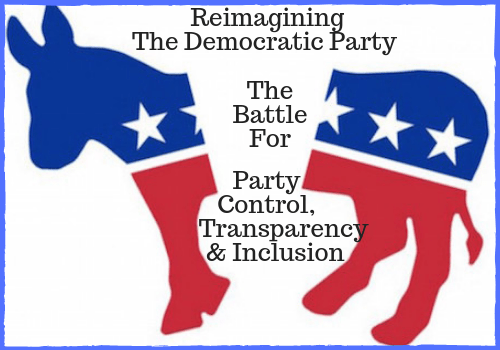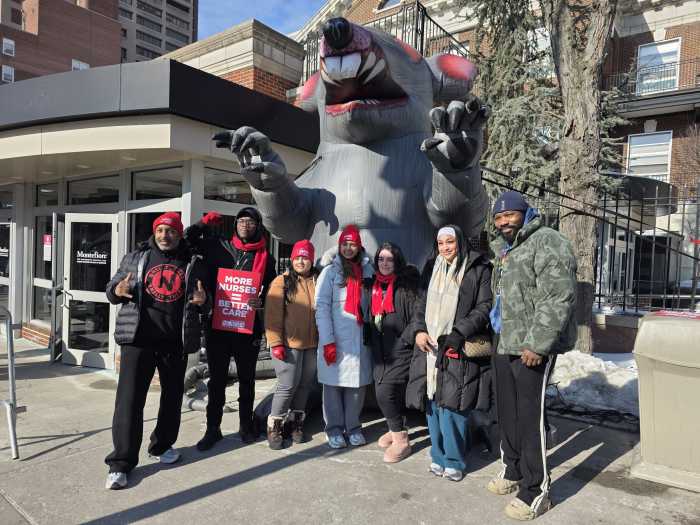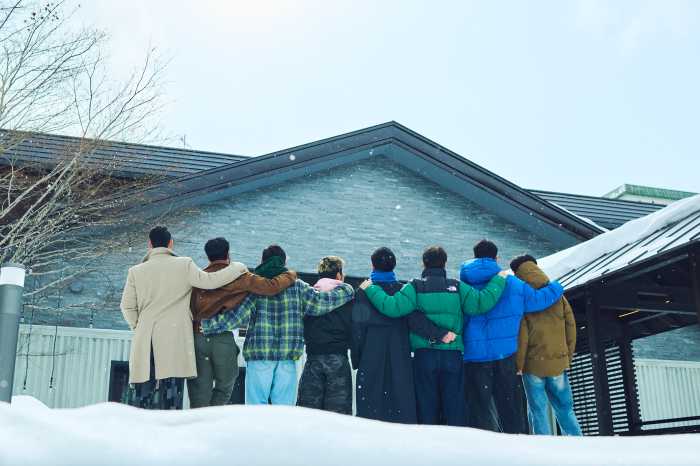In person, U.S. Rep. and Queens County Democratic Party Chair Gregory Meeks has a passion, energy and expertise when speaking about politics that is tangible and real.
Raised in the grand African-American tradition of social activism, Meeks’ upbringing is rooted in the Great American Black Migration from Rock Hill, South Carolina to East Harlem, where he grew up in a public housing project, but knew since his early years that he wanted to be a lawyer.
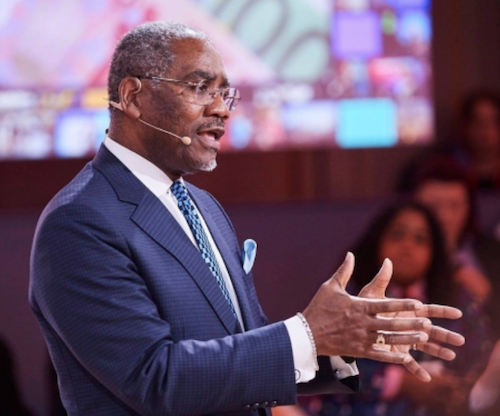
Meeks, 66, actualized these dreams after earning a bachelor’s degree in history from Adelphi and finished his formal education at the prestigious Howard University Law School. He went on to work as a Queens County Assistant District Attorney prosecutor for a special anti-narcotics taskforce, and chief administrative judge for New York State’s worker compensation system.
In 1992, he was elected to the State Assembly, where he served until 1998, when he won a special election to represent New York’s Fifth Congressional District and the neighborhoods of Jamaica, Laurelton, Rosedale, Cambria Heights, Saint Albans, Springfield Gardens, The Rockaways, and the John F. Kennedy International Airport.
The following edited interview took place at Meeks’ District office in Jamaica. Typical of Meeks energy and work ethic, it took place at 6 p.m. on a Friday, following a week of legislative work in Washington and a sleepless government business trip to Guyana, that Meeks took as the senior member of the Foreign Affairs Committee and Vice-Chair of the Western Hemisphere, Civilian Security, and Trade Subcommittee.
Queens County Politics (QCP): So I see since you’ve been unanimously elected the new Queens County Democratic County Chair last year you’ve revamped your website, https://www.queensdems.com/, and have found new ways to engage residents to get involved in local government. What are some other messages you want to deliver to fellow Democrats?
Rep. Meeks: So we are communicating with folks in any level of ways so they know what we are doing. One of the things I think is important is sometimes folks don’t realize that the members of our Queens county organization – district leaders and others – are just ordinary people. They are volunteering, for the most part, a number of them work and still care about the community in which they live. We need to highlight who they are. I think that’s really important so that folks get to know the individuals who are representing them whether, in public office or party offices.
We also want to let folks know when Democratic clubs are meeting and what Democratic clubs are doing. We want to make sure folks know that also. I’m making a concerted effort to go to every club at some point. I’m going to two this weekend. We understand we’re a borough with great diversity in several different ways. Diversity in ethnicity, diversity in geography, and diversity in ideas and ideology.
And that’s what makes the Democratic Party, in my estimation, the greatest party. We’re not monolithic like the Republican Party. That’s still our greatest strength. It makes it a little tough because we’re going to have debates on issues, and it depends upon where you come from. I represent the people, for example, in the 5th Congressional district in Southeastern Queens. Their issues may be different than the issues that [U.S. Rep.] Tom Supozzi represents in Northern Queens, but you’ll find there are things we can agree upon that will benefit Queens as a whole. And he represents his district as I represent mine. That’s the way it’s supposed to be, but we’re all Democrats and we’re all on the same team. I want to make sure there’s room for everybody in the Queens Democratic organization.
QCP: This includes the new progressives like U.S. Rep. Alexandria Ocasio-Cortez (AOC) and others even more to the left progressives?
Rep. Meeks: Yes, but not with the intent of tearing it apart and destroying the party. If your intent is you want to run because you just want to end the party and who the party is then that there’s no room for others in the party who don’t think like you. That’s not what we’re about. There should be room within the party for individuals who don’t think like you. That’s diversity. I want you to come about, bring your thoughts and ideas, and then the hardest part of this job is to try to negotiate and work things out so there are certain things we can unite on as a party.
I use the presidential race as an example. We all may have different Democratic choices based upon our whole philosophies but I think we should all agree that no matter who wins the Democratic Primaries, we have to get together and make sure its not Donald Trump who gets re-elected because we’re going to stay home. We have to be enthusiastic for whoever that is even if their ideas are not exactly in the same as mine.
So it’s the same thing in the county organization. The interests of Bayside are not necessarily in the same interests of those in Jamaica Queens. The issues in Astoria are different than the issues in Flushing. We’re all Democrats and we are all part of the Democratic Party and if that’s the case we can all come together and figure it out. Not come and say we’re going to tear down the organization or this one is corrupt and that one is corrupt. Now, that’s not the deal.
QCP: So how would you characterize yourself differently than say your predecessor, former U.S. Rep. Joe Crowley as the county boss?
Rep. Meeks: I’m not trying to emulate anybody. I’m bringing my own style to it, which is to make sure it’s inclusive. What’s important to me and I say this wherever I go is we talk about diversity being our strength, I want to make sure people see and feel that diversity so I am very focussed in trying to make sure that when it comes time to have nominations and people we are supporting for different public offices or justices or anything else, that it’s reflective of the diversity of Queens County. Reflective of its ethnically, geographically and ideologically.
A judge, for example, should be someone reflective of those communities and people should be able to go into a courthouse with the opportunity and the probability of having a judge of their peers. Someone that comes from them, looks like them and thinks like them. It’s not going to be everybody because not everybody thinks that way but there should be somebody for everybody. That’s how I operate. I try to operate in an open fashion. I talk to everybody. I talk to individuals who are with me and I talk to individuals who are against me. They may walk out of the office after we met and disagree with me, which is ok, but I understand I should talk to them. They’re Democrats. I want to talk to them. I want to tell them there’ room for everybody. Just don’t come down and say that we don’t need the county organization..
It’s important that everybody has a role to play. So now that I’m the county chair I’m going to embrace differences, but don’t try to change the rules because I’m the chair, because I have found all too often, especially when people of color become chair, that all of a sudden the rules change.
I understand the responsibilities I have as the chair and I’m going to live up to those responsibilities as the county chair. I understand I have to look back and look at the good things and the bad things that I think we can correct in the organization. To do that, which is no different than any other person that comes in as the CEO of a company, you come back and make the improvements that you think and I’m going to do those things…
QCP: And what are some of the improvements you’re looking at?
To be more inclusive and promote the people from within the organization. Folks who know who we are and make the organization more transparent because some folks commonly think its two or three people in a room and that’s’ all there is. They don’ know whoever else is in the room or whoever else is part of the organization. I want folks to know who they are. I think it’s important.
I think its also important that we are inclusive and have a lot more young people get involved. Get their thoughts and ideas and have them get involved in the organization. If you don’t do that you’re not moving into the future. And so we want individuals involved and think forward, not backward. To understand things have changed and that’s why when you think about what tomorrow’s world is going to be. It’s going to be completely different than when I was a child so we got to think about in politics too. We have to change and move, too. To not resist it but to accept it and to look at it and be motivated by it and to think ahead…
QCP: The recent District Attorney’s race was highly contentious between the eventual winner, former Borough President Melinda Katz, who the county organization supported, and Tiffany Cabán, whom the Democratic Socialists of America and many progressives supported. Among the ideas often stated is the idea of big money and corporate donations towards campaigns. What are your thoughts on big money versus small money campaign donations?
U.S. Rep. Meeks: I supported Melinda Katz. Her [Cabán] opponents said they didn’t want big money donations, but most of their money came from outside the state and if you look at it there was some big money that came in too. People that live here in Queens should have a say. The small businesses, the big businesses – all those that live and work here in Queens and in New York, they should have a say. They are part of the fabric of who we are. The labor unions. Those are the workers here. They should have a say. So it’s different than those who stay outside of New York. They have different issues. I’m not going over there and telling them who they should be representing them in California and other areas of the country so I don’t want them to come here and tell us who we should be electing and what the politics should be here in New York and Queens County.
QCP: A major role of the county organization is in screening potential judges. Tell me about the Judicial Screening Committee in Queens.
Rep. Meeks: I’m working on one as we speak. That’s one of the things that I needed to do when I came in. But here’s the deal. I don’t want a screening committee that’s not diverse. That’s not inclusive. That doesn’t have different people on it. That’s a process I don’t want, but what I do want and what I have put together is a screening committee that includes various bar associations.
So in Queens, for example, you have the Queens County Bar Association, but you also have the Macon Black Bar Association, you have the Latino Bar association, you have the South Asian Bar Association, you have the Catholic Bar Association, you have the Jewish Bar Association. I want all the bar associations to have a part of all that, as well as there should be somebody from the civic community. Not just lawyers, but some people from the community. They have to be part of the screening committee. So let’s put that together so that we know that it includes people at the table that come from different backgrounds and different viewpoints. We need to try to make sure that it’s a level playing field so that the judicial branch reflects again the county of Queens ethnically, geographically and ideologically.
QCP: It must be tough balancing the work of being a Congressman and the Queens County Chair, especially as it’s often been said that the Democratic Party chair in each borough comes in with a target on their back for criticism. How do you deal with that?
Rep. Meeks: I took this job knowing I’m going to have a target on my back. But let me tell you something as an African-American who’s fought hard within the party to make sure that we were part of the Democratic Party, I was not going allow there to be a vacuum. As an African- American, I had to step up. So I looked at it as a responsibility. Too many people have died and fought to get African-Americans to become part of the political system.
I look at Ella Baker and Fannie Lou Hamer. They fought not to tear the Democratic Party down, but to be in the Democratic Party, and now we got a position in Queens County to have an African-American to lead the Democratic Party. I know its extra work on my back. I know it’s going to take more time from me but look, people died so people can get into these positions and move up. So I have a responsibility to step up. I think that’s important and I could represent just as others could represent all communities. I can represent as an African-American all communities, and that’s what we’re doing. We’re not leaving anybody out. We fought too long and too hard not to be in positions of importance and in charge.
QCP: Recently Brooklyn Borough President Eric Adams made some comments that people from Iowa and Ohio can leave New York City and go back to where they came from. What is your view on those comments?
Rep. Meeks: I think it might not have been the way it wanted to come out but I understand some of the things that Eric Adams had said because I said some similar things myself. I welcome everybody in the borough, ok. Welcome everybody, but there are some folks that just got here. They are the gentrifiers and they are welcome but don’t come here and think you can tell those that lived here and with blood sweat and tears sacrificed here how it’s going to be. We’re not going to stand up and say what we think is important for this borough, while they just try to tell us what to do.
I want folks to come in and to work with us, to become part of our political clubs and our system. To volunteer to do certain things. But don’t come in and want to tear everything down and say we’re corrupt or we’re not part of the community. That we are out of touch and all of those things. That’s inaccurate. There’s people in Queens County that have been here a long time and for a while. These are good, hardworking everyday people. Many belong to labor unions. They are significant and important. I support them. We should all support them.
QCP: Do you think that might have been the case with Amazon? They had planned to put their second headquarters in Long Island City near NYCHA’s Queensbridge Houses and backed out because of the extreme pushback from mainly young white progressives.
Rep. Meeks: I was for Amazon in a big way and now Amazon left town. It would have made a difference for Queensbridge residents. It wasn’t for the benefit for those residents to have Amazon back out of the deal. It was to the benefit for some of the newer residents that just moved in there. We were working deals out where Amazon was going to be able to create jobs and training throughout the borough of Queens, and the jobs we were talking about with Amazon were six-figure jobs. We were going to make sure we were training people in Long Island City, in the Astoria houses, in the Queensbridge Houses and they would make more money.
So now they leave with nothing there. So you leave a neighborhood that no one was investing in or would invest in those areas and for what? Young kids don’t get a chance to see. Here was a chance for folks to see an opportunity. Go to my district again. I was in Far Rockaway, in pubic housing where I talk to young people who can see the skyline of Manhattan but never been to Manhattan. So they don’t even know the opportunities that are there for them. Let’s bring those opportunities to them and train them for those opportunities. And they then can live a different life.
QCP: I see you’re backing City Councilman Donovan Richards for borough president…
Yes, I’m backing in a very big way, Donovan Richards. He’s a young man, who is progressive but has great vision. He was for Amazon for example. You can’t say he’s not progressive. He was the head of the progressive caucus in the city council and yet he understands the business community and development so he has a little bit of both and I think he has tremendous potential to bring this borough together. To make sure everyone receives their just due as borough president and not short change anybody. He’s earned it and has shown ability in the city council. So I’m behind him in a very big way, and we supported him as a county in a vote. There was only two or three abstentions and everybody else supported him. All the district leaders from all over the borough.
QCP: Finally, AOC has become a national figure and progressive poster child, traveling around the country, but her district is mainly in Queens. Does she get involved in county politics at all?
She has not. She has not gotten involved in county politics other than she did not support our candidate for DA. We talk a bit, but not about Queens County Politics. She serves on the House Financial Services Committee as do I. We have talked about those issues and sometimes we agree and sometimes we don’t. So we talked about those issues and work together in that regard. As far as politics we haven’t had a conversation in that regard. She hasn’t been open, but should she want to be part of the county organization, I would welcome her. If she wants to have that conversation or anybody, I would welcome them.


